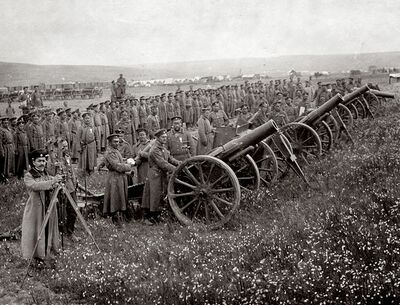Syaran-Ruvelkan War
| Syaran-Ruvelkan War | |||||||
|---|---|---|---|---|---|---|---|
 Syaran artillery in Zemplen | |||||||
| |||||||
| Belligerents | |||||||
|
|
| ||||||
| Commanders and leaders | |||||||
|
|
| ||||||
| Units involved | |||||||
| Ruvelkan Red Army | Army of the Syaran Republic | ||||||
| Strength | |||||||
| 1.5 million troops (peak) | 1.2 million troops (peak) | ||||||
| Casualties and losses | |||||||
|
525,000 killed 1.6 million wounded |
450,000 killed 1.3 million wounded | ||||||
The Syaran-Ruvelkan War (Syaran: Војна на Сиара-Рувелкан) was an armed conflict fought between the Republic of Syara and the Ruvelkan Socialist Republic from October 1907 to March 1910. The war erupted over territorial disputes between the two nations, culminating in heavy fighting among many of the contested border regions. A ceasefire was agreed to and hostilities concluded after Ruvelka has seized control of 70% of Zemplen, though an official peace treaty was never signed; this was rendered null by the collapse of the Socialist Republic less than a decade later.
Following the collapse of the Arokennite Empire in the early 1700s, both Syara and Ruvelka had emerged as fractured, divided nations. Ruvelka unified in 1730 under the Ruvelkan Imperium, a loose confederation of states while Syara remained divided until 1875. During the intervening time conflicts between Syara's independent Realms and the Ruvelkan states were common, the first major one being the Ruvelkan-Galanian War in 1842, which ended in a Ruvelkan victory. In 1873 however the Kingom of Makedon had defeated the recently established Ruvelkan Socialist Republic in the Ruvelkan-Makedonian War, which directly lead to the Conference of Pella and the Unification of Syara just two years later. The resulting Republic of Syara inherited the many border disputes with Ruvelka, and tensions between the two states were high leading into the 20th century. Between 1901-1906 Syara repressed three major socialist-inspired revolts, accusing the Ruvelkans of supporting the rebellions and encouraging sedition within Syara. In October 1907, suspecting a more overt Ruvelkan effort was being planned, Syara invaded northern Ruvelka, aiming to capture the capital of Kapsovar as the Makedonians had done 34 years prior.
Unlike the rapid maneuvers of the Ruvelkan-Makedonian conflict, fighting between the Ruvelkan Red Army and the Army of the Syaran Republic quickly bogged down into a war of attrition, due in part to the increased proliferation of heavy artillery and machineguns, as well as the increased usage of trenches as defensive fortifications. The initial Syaran drive on Kapsovar faltered, and in the spring of 1908 the Ruvelkans counter attacked into Zemplen. The Ruvelkans made modest progress and captured Sopron later in the fall, however a concurrent offensive into Imerti ended with defeat. A Syaran counter-offensive during the winter failed to dislodge the Ruvelkans from Zemplen, whom steadily expanded their zone of control through a series of costly offensives throughout 1909. Faced with the prospect of losing most of Zemplen, the Syarans launched another effort against Kapsovar in the winter of 1909-1910, but were defeated once again by the Red Army. Unable to secure victory on the battlefield, the Syarans pushed for a ceasefire which the Ruvelkans agreed do, ending the war 15 March 1910.
The war had far reaching implications for both Syara and Ruvelka. The war nearly bankrupted the Socialist Republic and strained the already fragile political scene within Ruvelka, contributing heavily to the instability that eventually resulted in the 1914 December Uprising. Syara's failure to defeat Ruvelka after it's earlier victory in the Makedonain-Ruvelkan War was seen by the Cacertian Empire as proof that the Syaran Republic would not constitute a serious threat, contributing to the Cacertian decision to launch the Divide War. The style of fighting and the heavy losses sustained by both sides is widely considered to have foreshadowed the warfare that would dominate the Ruvelkan Civil War and the Desopya Campaign. Syara would later regain control of Zemplen during the chaos of the Ruvelkan Civil War.